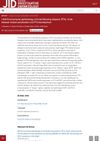Search
for
Sort by
Research
750-780 / 801 resultsresearch Gamma Delta T Cells as Novel Players in Alopecia Areata Pathobiology: Vdelta1 Positive T Lymphocytes May Recognize Stressed Hair Follicle Keratinocytes, Leading to IFN Gamma-Dependent Hair Follicle Dystrophy and Immune Privilege Collapse
Targeting specific T cells may help treat alopecia areata.

research Environmental Pathobiology of Frontal Fibrosing Alopecia: A Link Between Linalool Sensitization and FFA Development
Being allergic to linalool, a common fragrance ingredient, might contribute to developing frontal fibrosing alopecia.

research Commonly Associated Disorders With Complete Scalp Alopecia in Early Childhood: A Review
Six genetic conditions are often linked to complete scalp hair loss in children.

research Efficacy and Safety of Platelet-Rich Plasma Therapy in Alopecia Areata Patients: A Systematic Review
Platelet-rich plasma therapy is a safe and effective treatment for alopecia areata.

research IL-15 Prolongs Hair Growth and Acts as a Guardian of Human Hair Follicle Immune Privilege
IL-15 helps maintain hair growth and protects the immune status of hair follicles.
research Genome-Wide Association Study in Alopecia Areata Implicates Both Innate and Adaptive Immunity
Alopecia areata involves both innate and adaptive immunity, with specific genes linked to the disease.
research Genetically Null Mice Reveal a Central Role for Epidermal Growth Factor Receptor in the Differentiation of the Hair Follicle and Normal Hair Development
EGFR is essential for normal hair development and follicle differentiation.
research Clinical and Immunological Phenotype of Patients With Primary Immunodeficiency Due to Damaging Mutations in NFKB2
Damaging mutations in NFKB2 cause a severe and distinct form of primary immunodeficiency with early-onset and often ACTH-deficiency.
research Hair Follicle as a Target of Stress Hormones and Autoimmune Reactions
Stress hormones and autoimmune reactions can cause hair loss.
research Hair Follicle Stem Cells in the Pathogenesis of the Scarring Process in Cutaneous Lupus Erythematosus
Damage to hair follicle stem cells causes permanent hair loss and scarring in cutaneous lupus erythematosus.

research Stem Cell-Derived Exosomes: Emerging Therapeutic Opportunities for Wound Healing
Tiny vesicles from stem cells could be a new treatment for healing wounds.
research Resident Human Dermal Gamma Delta T-Cells Operate as Stress Sentinels: Lessons from the Hair Follicle
Human dermal γδT-cells respond to stress in hair follicles, contributing to hair loss.
research Co-Factors of LIM Domains (Clims/Ldb/Nli) Regulate Corneal Homeostasis and Maintenance of Hair Follicle Stem Cells
Clim proteins are essential for maintaining healthy corneas and hair follicles.

research PPAR-γ Signaling as a Key Mediator of Human Hair Follicle Physiology and Pathology
PPAR-γ is important for healthy hair and its problems, and more research on PPAR-γ treatments is needed.
research Pro-Inflammatory Vδ1+ T-Cells Infiltrates Are Present In And Around The Hair Bulbs Of Non-Lesional And Lesional Alopecia Areata Hair Follicles
Targeting Vδ1+T-cells may help treat alopecia areata.
research Emerging Roles of Sox6 in the Renal and Cardiovascular Systems
Sox6 is important in heart and kidney health, affecting diseases like diabetes, heart disease, and high blood pressure.
research Mesenchymal Stem Cells Antagonize IFN-Induced Proinflammatory Changes and Growth Inhibition Effects via Wnt/β-Catenin and JAK/STAT Pathway in Human Outer Root Sheath Cells and Hair Follicles
Mesenchymal stem cells may help treat hair loss by improving hair cell growth and reducing inflammation.
research Immunotherapeutic Effects of Allogeneic Mesenchymal Stem Cells on Systemic Lupus Erythematosus
Early treatment with the right dose of stem cells can reduce lupus symptoms.
research Erosive Pustular Dermatosis: A Manifestation of Immunosenescence - A Report of 8 Cases
Erosive pustular dermatosis in elderly people may be linked to aging immune systems and skin damage.

research MAIT Cells in COVID-19: Heroes, Villains, or Both?
MAIT cells may help fight COVID-19 but also contribute to severe inflammation.

research Presence of Mast Cells and Mast Cell Degranulation in Scalp Biopsies of Telogen Effluvium
The study suggests that mast cells might be involved in the hair loss condition telogen effluvium and could be a target for treatment.

research Immune Cells in Cutaneous Wound Healing: A Review of Functional Data from Animal Models
Different immune cells like platelets, mast cells, neutrophils, macrophages, T cells, B cells, and innate lymphoid cells all play roles in skin wound healing, but more research is needed due to inconsistent results and the complex nature of the immune response.
research Mitochondrial DNA 10158T>C Mutation in a Patient with Mitochondrial Encephalomyopathy with Lactic Acidosis and Stroke-Like Episodes Syndrome
A patient with a rare disease had a unique genetic mutation linked to their symptoms.

research Tissue Engineering and Regeneration of the Human Hair Follicle in Androgenetic Alopecia: Literature Review
Tissue engineering could be a future solution for hair loss, but it's currently expensive, complex, and hard to apply in real-world treatments.

research Analysis of LncRNA-mRNA Co-Expression Profiles in Patients With Polycystic Ovary Syndrome: A Pilot Study
Different types of RNAs are found in varying amounts in patients with Polycystic Ovary Syndrome, suggesting they could be important in the disease's development and potentially used as disease markers.

research The Effect of Ovine Secreted Soluble Factors on Human Dermal Papilla Cell Aggregation
Sheep-derived factors improve human hair cell clustering, which may help hair growth.

research A Case Series and Literature Review of Telogen Effluvium and Alopecia Universalis After the Administration of a Heterologous COVID-19 Vaccine Scheme
Some people experienced hair loss after COVID-19 vaccination, but it's very rare and vaccines' benefits are greater than this risk.

research Stem Cell Secretome as a Mechanism for Restoring Hair Loss Due to Stress, Particularly Alopecia Areata: Narrative Review
Stem cells and their secretions could potentially treat stress-induced hair loss, but more human trials are needed.
research Microneedling Combined With Compound Betamethasone in Treatment of Severe Alopecia Areata: A Case Report
Microneedling with betamethasone led to almost complete hair regrowth in severe alopecia areata.